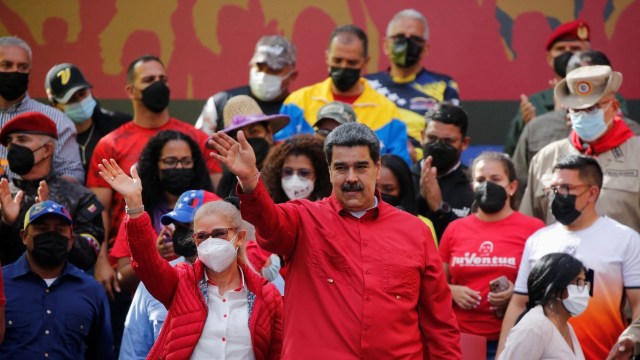
Nicolás Maduro may be happily sitting in the Miraflores Palace in the northern section of Caracas’s urban sprawl, but the country he governs with an iron fist remains in a state of economic paralysis. Maduro’s nine years in power (he won his first election in 2013 by a percentage point) have been nine wasted years for Venezuela and its people.
By Washington Examiner – Daniel DePetris
May 19, 2022
Politically, Venezuela turned into an authoritarian state long ago, with all levers of government solidly in the hands of Maduro and his party. Economically, the South American nation is a basket case, with gross domestic product declining every single year since Maduro has been in charge (during his January 2022 state of the union address, Maduro claimed Venezuela’s economy grew by 4% last year). Over 6 million Venezuelans have left the country, and according to a 2020 U.N. survey, over 9 million people, one-third of Venezuela’s population, are “food insecure.”
Washington has long looked at Venezuela as one big dumpster fire. The solution in the minds of multiple U.S. administrations was to punish Caracas for human rights abuses, depose Maduro, and replace his regime with a return to democracy. The Obama administration began imposing human rights sanctions on the Venezuelan government in 2014. The Trump administration went full steam ahead on the economic pressure, sanctioning Venezuela’s oil industry (Venezuelan crude exports were reduced by nearly 70% between 2017 and 2020), cutting the country off from U.S. banks, and even indicting Maduro for drug trafficking. None of it pushed Maduro out of office or instigated an internal rebellion against his rule. However, the sanctions did make Venezuela a poorer nation and the Venezuelan people’s lives more miserable.
The United States is gradually changing its approach. In early March, senior U.S. officials flew to Caracas to meet with Maduro government representatives, the first high-level meeting in years. While no agreements were struck, the visit managed to break the ice. Days later, Venezuela released two American detainees and agreed to keep the lines of communication open.
This week, the Biden administration took another step, allowing Chevron, the only major American oil company still operating in Venezuela, to begin negotiations with PDVSA, Venezuela’s state-run oil company, on future operations. While Chevron still can’t enter into any deals with Venezuela’s oil sector, the sanctions relief sends Caracas a signal that Washington is prepared to negotiate more comprehensive sanctions lifting if free and fair Venezuelan presidential elections are held.
U.S. officials speaking to reporters on background have stated that the sanctions exemptions are part of a “very honed approach,” in which U.S. economic concessions are directly tailored to whatever political concessions Maduro is willing to provide. A resumption of peace talks between Maduro and the opposition alliance led by Juan Guaido, whom Washington still recognizes as Venezuela’s legitimate president, is expected to be announced this week after a monthslong hiatus. Those intra-Venezuelan talks, mediated by Norway and inaugurated in August 2021, broke down last October after Maduro walked away in retaliation to the extradition of Alex Saab, a pro-Maduro businessman and fixer, to the U.S. for a $350 million bribery scheme. Saab remains in a U.S. jail cell awaiting trial.
Maduro once said negotiations with the opposition would never restart unless Saab were returned. However, the Venezuelan leader is far less concerned with the fate of one man than he is about getting Venezuela’s dilapidated oil industry running again. The sooner the oil begins to flow, the more profits the Venezuelan government has to pay off its supporters in the military. The question still left to be answered is whether the former bus driver-turned Hugo Chávez protege-turned wily president is willing to go through with fair elections and risk a defeat at the polls to get there.
…
Read More: Washington Examiner – Is the US approaching a diplomatic breakthrough in Venezuela?
…

